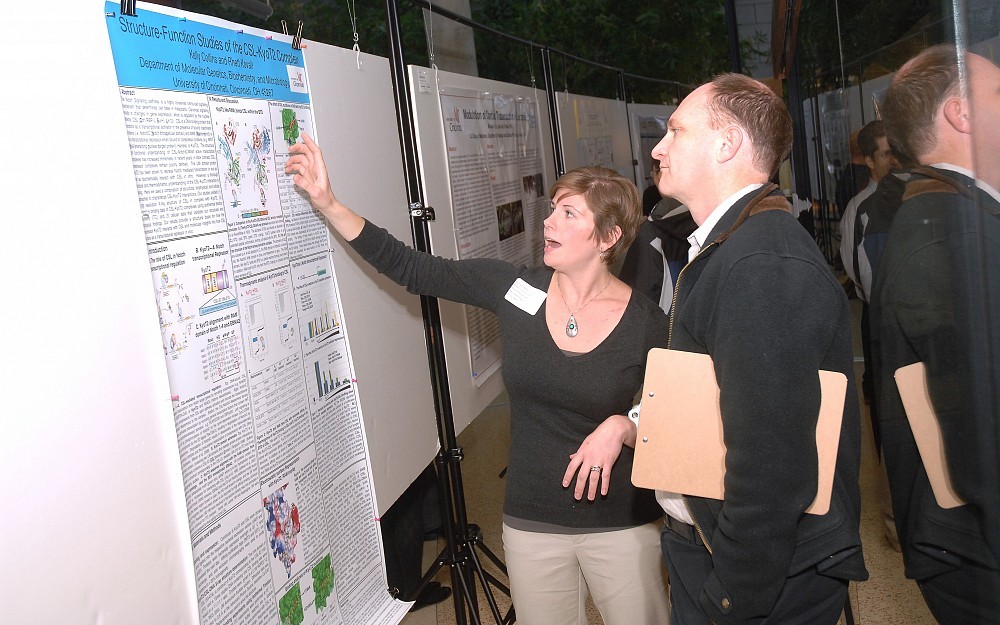
Graduate Programs in the College of Medicine Will Convert to Semesters
By this time next year, faculty, staff and students at 13 of UC's colleges and one of its degree-granting units will have several months of semester conversion under their belts, with hopefully few hiccups. At the UC Academic Health Center (AHC), three collegesnursing, pharmacy and allied health scienceswill undergo the conversion, along with some of the graduate programs at the College of Medicine. All are working hard to ensure that their policies and procedures are updated to align with UCs new semester schematic (more details of which can be found at www.uc.edu/conversion).
This month, were asking faculty and administrators at these colleges to give us some insight into what the conversion means to existing and potential students there.
Below, Mary Jo Peterman, program director in the office of research and graduate education at the College of Medicine, discusses how the conversion process will affect the college. For more information on semester conversion, see the student guide at www.uc.edu/content/dam/uc/conversion/docs/faqs/guide.pdf.
What are the MS and PhD programs in the College of Medicine that will be affected by semester conversion?
PhD Degree Programs:
Biomedical Sciences FLEX Option
Biostatistics & Epidemiology
Cancer & Cell Biology
Environmental & Industrial Hygiene
Environmental Genetics & Molecular Toxicology
Immunobiology
Molecular & Developmental Biology
Molecular, Cellular & Biochemical Pharmacology
Molecular Genetics, Biochemistry & Microbiology
Neuroscience
Systems Biology & Physiology
MS Degree Programs:
Biostatistics & Epidemiology
Clinical & Translational Research
Environmental & Industrial Hygiene
Genetic Counseling
Immunobiology
Medical Physics
Molecular, Cellular & Biochemical Pharmacology
Physiology (MS, a 1-year MD Prep Program)
Public Health (MPH)
Why are PhD and MS programs affected in the College of Medicine and not the MD program?
"Education programs in the College of Medicine are not limited to medical school. The medical student curriculum is already on a block system created when the medical education curriculum changed in August 2011. Technically, the medical school students are also converting to semesters (insofar as when they register for classes and how theyre billed) but that schedule is totally independent from the PhD and MS programs here and those at the rest of the university."
What kinds of changes will students see?
"MS and PhD programs in the College of Medicine have taken this opportunity to evaluate their educational goals and focus. Besides the obvious change, which is from 10 weeks per term over four quarters (autumn, winter, spring and summer) to 14 weeks per term over three semesters (fall, spring and summer), students will, in some cases, have less coursework. Some programs have combined courses that were previously taught over two quarters into one course that will be taught in one semester. Other courses have been revamped and the content has been changed to reflect the expanding and evolving scientific theory and research."
Related Stories
Can new rules in Ohio address a pharmacy staffing shortage and...
May 17, 2024
The University of Cincinnati's Michael Hegener joined WVXU's Cincinnati Edition to discuss recent rules released by the Ohio Board of Pharmacy designed to address pharmacy staffing.
Is ketamine the answer to treatment-resistant depression?
May 16, 2024
The University of Cincinnati's Stephen Rush joined WVXU's Cincinnati Edition to discuss the use of ketamine and esketamine to treat treatment-resistant depression.
UC study: Severe ischemic strokes rare in total patient...
May 15, 2024
The University of Cincinnati’s Yasmin Aziz will present research at the European Stroke Organisation Conference that found severe ischemic strokes with the most severe damage are rare in the total stroke patient population.
